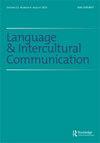Language, culture and interculturality: global debates, local challenges
IF 2.2
1区 文学
0 LANGUAGE & LINGUISTICS
引用次数: 0
Abstract
This issue of LAIC brings together a selection of articles, revised and refereed, that, with one exception, grew out of presentations delivered at the 2021 conference of the International Association for Languages and Intercultural Communication (IALIC), on Language, culture and interculturality: global debates, local challenges. This conference was remarkable in a number of ways. For the first time in its two-decade history, the IALIC conference was hosted in South America, by the Universidad de los Andes in Bogotá in Colombia. While the organisers originally hoped that this would be an in-person event, the ongoing COVID-19 pandemic ultimately forced the conference online. This turned out to be a mixed blessing. While IALIC participants were denied the opportunity to visit Bogotá in person and enjoy the hospitality of what would have been an excellent conference venue in the Universidad de los Andes, the number of international participants increased both in their number and their diversity. With more than 200 online contributions coming from all over the Americas, Europe, Asia, Africa and Oceania, the 2021 IALIC conference became a truly global critical space in which to explore the nature of interculturality. The conference theme, conventionally broad in scope, invited participants to revisit and critique our theoretical and practical assumptions as scholars, educators and practitioners of interculturality, particularly in times of crisis. The contributors accepted the invitation with gusto, addressing and contesting established models of language, intercultural communication, and the modes by which we research and measure our outputs. Among the plenaries, Claire Kramsch raised specific concerns about the ways in which educators and students might engage in political debate around conflict in the language classroom, focusing on case studies of anti-Asian prejudice in the United States, the commemoration of Hiroshima, Israeli-Palestinian relations, and attitudes in Italy towards Muslim immigrants. Her discussion was complemented by Anne-Marie Truscott de Mejía, who reported on an international research project, carried out in Bogotá and in Paris, aimed at helping in-service language teachers and learners to grasp the complexity of intercultural relationships, with a particular reference to gender relations and the urban-rural divide. Emergent themes from the conference presentations included the challenges and affordances of researching multilingually, post-qualitative research methodologies, innovative ways of composing intercultural autoethnographies, arts-based research approaches, and bio-narratives. Appropriately, for the first IALIC conference in South America, a prominent theme was the decolonisation of language pedagogy, curricula and materials, especially when the major languages taught are potent symbols, not only of colonial hegemony but also of a scientific and economic positivism that holds out the promise of future prosperity. It is fitting, then, that this special issue should include a revised version of a plenary presentation given by Manuela Guilherme, whose own history with IALIC stretches back to her presence at two ground-breaking conferences in Leeds, in 1997 and 1998, that led directly to the birth of the association in 2000. Guilherme surveys the developing nature of the topics presented at the series of conferences, from Leeds to Bogotá, finding in the presentations offered evidence of an increasing appetite among contributors to decentre from Eurocentric frameworks of interculturality, which, in the late 1990s, were coalescing into the first edition of the Common European Framework of语言、文化和跨文化:全球辩论,地方挑战
本期《语言与文化交流》汇集了一系列经过修订和审稿的文章,除了一篇例外,这些文章都是在国际语言和跨文化交流协会(IALIC) 2021年会议上发表的关于语言、文化和跨文化:全球辩论、地方挑战的演讲中产生的。这次会议在许多方面都是非凡的。在其20年的历史中,IALIC会议首次在南美洲由哥伦比亚波哥大的洛斯安第斯大学主办。虽然组织者最初希望这将是一次面对面的会议,但持续的COVID-19大流行最终迫使会议在网上举行。结果证明这是一件喜忧参半的事。虽然国际咨商协会的与会者没有机会亲自访问波哥大,也没有机会在洛斯安第斯大学这个极好的会议地点受到款待,但国际与会者的人数和多样性都有所增加。来自美洲、欧洲、亚洲、非洲和大洋洲的200多篇在线投稿使2021年IALIC会议成为探索跨文化本质的真正全球性关键空间。会议的主题,传统上广泛的范围,邀请与会者重新审视和批评我们的理论和实践假设作为跨文化的学者,教育者和实践者,特别是在危机时期。作者们兴致勃勃地接受了邀请,对语言、跨文化交流的既定模式以及我们研究和衡量产出的模式进行了讨论和质疑。在全体会议上,克莱尔·克拉姆什(Claire Kramsch)对教育工作者和学生可能在语言课堂上参与围绕冲突的政治辩论的方式提出了具体关切,重点关注美国的反亚洲偏见、广岛纪念活动、以色列-巴勒斯坦关系以及意大利对穆斯林移民的态度等案例研究。Anne-Marie Truscott de Mejía补充了她的讨论,她报告了在波哥大和巴黎开展的一个国际研究项目,该项目旨在帮助在职语言教师和学习者掌握跨文化关系的复杂性,特别是性别关系和城乡差距。会议报告的新兴主题包括多语言研究的挑战和启示、后定性研究方法、跨文化自我民族志创作的创新方法、基于艺术的研究方法和生物叙事。恰当地说,在南美洲举行的第一次国际语言联盟会议的一个突出主题是语言教学法、课程和材料的非殖民化,特别是当所教授的主要语言不仅是殖民霸权的有力象征,而且是科学和经济实证主义的有力象征,预示着未来繁荣的希望。因此,这期特刊应该包括Manuela Guilherme的全体会议报告的修订版,她与IALIC的历史可以追溯到1997年和1998年在利兹举行的两次开创性会议,这直接导致了该协会在2000年的诞生。Guilherme调查了从利兹到波哥大的一系列会议上提出的主题的发展性质,在演讲中发现了证据,表明贡献者越来越有兴趣从以欧洲为中心的跨文化框架中分离出来,这些框架在20世纪90年代末合并成第一版的欧洲共同框架
本文章由计算机程序翻译,如有差异,请以英文原文为准。
求助全文
约1分钟内获得全文
求助全文
来源期刊

Language and Intercultural Communication
Multiple-
CiteScore
3.00
自引率
47.40%
发文量
50
期刊介绍:
Language & Intercultural Communication promotes an interdisciplinary understanding of the interplay between language and intercultural communication. It therefore welcomes research into intercultural communication, particularly where it explores the importance of linguistic aspects; and research into language, especially the learning of foreign languages, where it explores the importance of intercultural perspectives. The journal is alert to the implications for education, especially higher education, and for language learning and teaching. It is also receptive to research on the frontiers between languages and cultures, and on the implications of linguistic and intercultural issues for the world of work.
 求助内容:
求助内容: 应助结果提醒方式:
应助结果提醒方式:


